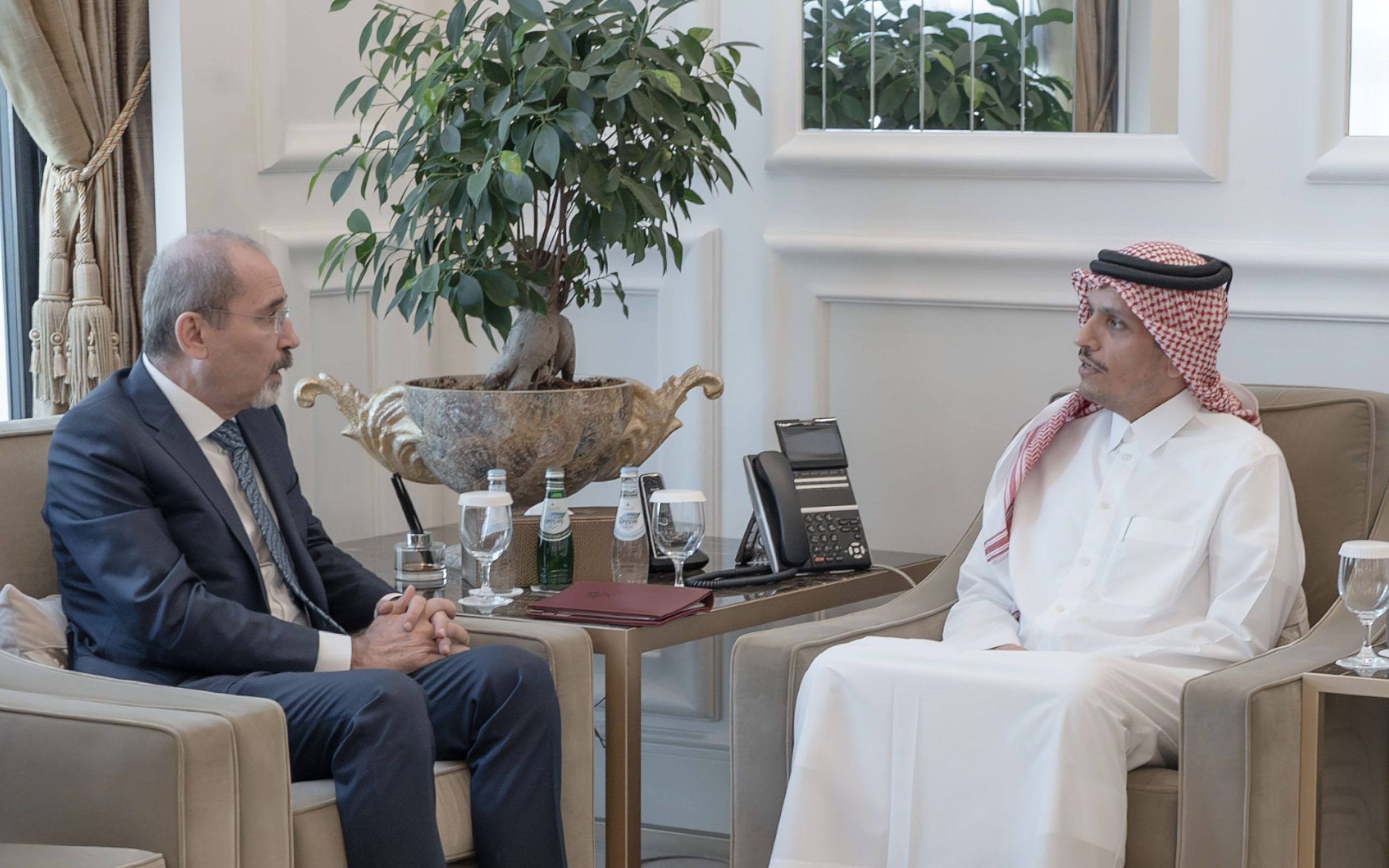Despite sharing ties with Israel, Jordan has taken a harder stance towards Tel Aviv since the beginning of the attacks on Gaza.
Qatar’s Prime Minister Sheikh Mohammed bin Abdulrahman Al-Thani and Jordan’s Foreign Minister Ayman Safadi discussed means for reaching a lasting ceasefire in Gaza during a meeting in Doha on Saturday.
“The two sides discussed the latest developments in the occupied Palestinian Territories, in addition to means for de-escalation and ceasefire in Gaza,” Qatar’s foreign ministry said in a statement.
Sheikh Mohammed, who is also Qatar’s foreign minister, called for the “immediate issuing of a binding” United Nations Security Council ceasefire resolution in addition to the entry of “sustainable humanitarian aid into all areas” of the Palestinian enclave.
“He [Sheikh Mohammed] reiterated the State of Qatar’s continued work with the Hashemite Kingdom of Jordan and the international community in order to achieve this,” the statement added, reiterating Doha’s rejection of Israel’s forced displacement of Palestinians.
The Jordanian foreign minister was in Qatar between December 10-11 for the Doha Forum, where he said Israel’s forced displacement of Palestinians through its war on Gaza matched the “legal definition of genocide.”
“What we are seeing in Gaza is not just simply the killing of innocent people and the destruction of their livelihoods, but a systematic effort to empty Gaza of its people,” Safadi said on December 10.
Jordan’s Prime Minister Bisher Khasawneh was also in attendance, where he stressed that the forced displacement of Palestinians out of Gaza also constituted a “material violation” of the 1994 Jordan-Israel peace treaty, known as Wadi Araba.
The treaty guaranteed Jordan the restoration of its occupied areas of Al-Baqoura and Al-Ghumar.
Jordan has been holding regular meetings with its international partners in hopes of halting the war on Gaza. The geographic proximity between Jordan and Palestine has raised Amman’s concerns over a refugee crisis and an expansion of the war.
On December 21, Jordan’s King Abdullah II met French President Emmanuel Macron in Aqaba, Jordan, where he stressed the need for an immediate ceasefire in Gaza.
Jordan’s King Abdullah II travelled to Qatar on November 2 where he met Qatar’s Amir Sheikh Tamim bin Hamad Al Thani and called for international action to effectively reach a ceasefire in Gaza.
The two leaders also attended the Arab-Islamic summit in Riyadh on Saturday. In his speech, King Abdullah highlighted that the “injustice” in Gaza “did not begin a month ago.”
Jordan’s bold stance against Israel
Despite sharing ties with Israel, Jordan has taken a harder stance towards Tel Aviv since the beginning of the attacks on Gaza.
On October 27, Jordan proposed a resolution on behalf of the Arab League to the United Nations General Assembly that called for a “humanitarian truce”. An overwhelming 120 nations voted in favour while 14 voted against it, including the United States.
The U.S. also used its veto power on Friday to block yet another ceasefire proposal.
On November 1, Jordan officially recalled its ambassador to Israel over the “unprecedented humanitarian catastrophe” in Gaza.
The kingdom said it would only send back its envoy if Israel halts its onslaught and called on Tel Aviv to recall its ambassador to Amman.
Jordan then decided to not sign a water-for-energy deal with Israel on November 17 over the Israeli aggression on the Gaza Strip.
“Can you imagine a Jordanian minister sitting next to an Israeli minister to sign the deal while Israel is killing our people in Gaza?” Jordan’s Foreign Minister Ayman Safadi told Al Jazeera at the time.
Jordan is home to the world’s largest Palestinian diaspora of more than six million, many of whom have a Jordanian citizenship, mainly due to the geographic distance between both countries.
Many Palestinians had fled to Jordan after the 1948 Nakba, or “catastrophe”, where Zionist militia forced out more than 700,000 Palestinians out of their lands to establish Israel. More Palestinians fled to Jordan during the six-day war of 1967, known as the Naksa or “setback”.
One in five people currently living in Jordan is Palestinian, according to recent data published by the New York Times. More than two million Palestinian refugees are in Jordan.
Jordan’s streets have witnessed almost weekly protests calling for a ceasefire in Gaza since the beginning of the genocide.
Israel has killed more than 20,400 Palestinians and wounded 54,000 others since the start of the genocide on Gaza, Palestine’s news agency, Wafa, reported on Sunday.
Euro-Med separately reported on December 23 that Israel killed at least 28,091 Palestinians, including 11,023 children. The figure is higher than the one reported by Gaza’s health authorities as it included victims believed to be under the rubble.







